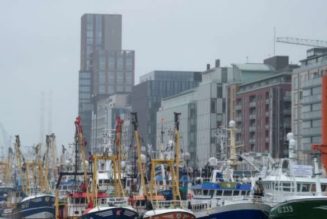By Jorge Gutierrez
Last week the Supreme Court brought unexpectedly good news to undocumented transgender and queer communities across the country related to the policy of Deferred Action for Childhood Arrivals, or DACA, and workplace protections.
First, on Monday, the Supreme Court ruled that Title VII of the Civil Rights Act of 1964 protects LGBTQ+ workers from workplace discrimination based on sexual orientation and gender identity. This ruling broadens the civil rights of trans and queer communities across the country, after years of questions of safety and economic uncertainty.
According to the Williams Institute at the UCLA School of Law, there are 667,100 trans adults in the United States who live 200 percent below the poverty line and, at the beginning of the coronavirus pandemic, an estimated 139,700 unemployed. Given that fact, this ruling can have a major impact on the lives of our community members in being able to access and maintain employment. Even then, we know there is more work to be done to ensure workers receive fair wages and benefits, such as access to health care, and much more.
Aimee Stephens, a trans woman who was fired from the Garden City, Michigan, funeral home where she worked after coming out, and who became one of the lead plaintiffs in the Title VII cases, sadly passed away before this decision was announced. But I know she was with us in spirit celebrating this tremendous victory that trans people brought before the courts and made possible. I know that many of us thought of her as this decision came down and as we continue to celebrate.
It is disappointing, though, that in 2020 this country is still debating whether trans and queer people have workplace protections, which means there’s still much to do to ensure trans and queer communities are can live safely and thrive.
Even with that favorable decision, many of us didn’t think the DACA decision would be a positive one. Months after Donald Trump took office, he moved to revoke the Obama-era policy, under which people who came here as children and who met specific criteria qualified for temporary protection from deportation, as well as get a work permit. Many organizers and groups, like Abolish ICE and Defund the Police Collective, were already preparing nationwide actions across the country in response to a negative decision given the Court’s well-known conservative makeup.
You can imagine the shock for many when we heard the decision. The Court ruled that the Trump administration broke the law in its attempt to get rid of DACA, effectively letting DACA continue. This is a huge sigh of relief for undocumented people who have benefitted from DACA, because it means DACA recipients are still protected from deportation and have a work permit. It means temporary relief from anxiety from those us who were following the case closely, waking up at 7 a.m. for the past month (I live in California and the court posted its decisions by 10:30 a.m. on the East Coast), as we frantically refreshed the Supreme Court’s website for new opinions.
Although this ruling means DACA lives, because the Supreme Court didn’t rule on the program’s legality, it also means that Trump can try again in the future to revoke the policy. We didn’t get enough time to celebrate before he indicated his plans on ending the program again the next morning.
We know this fight is far from over. In many ways, it’s just beginning.
DACA was made possible thanks to the organizing efforts of young immigrants, many of them queer, who pushed President Obama to announce it in the summer of 2012. Even with DACA, there were 3 million deportations under Obama, which Trump has continued and massively expanded.
For many of us, including myself, DACA was never the end goal. We knew in 2012 that DACA was supposed to be a stepping stone towards liberation and protection for all our families, especially those who are often deemed not deserving of rights. Our end goal is the safety and liberation of all people, but especially of trans and queer undocumented people.
So what’s next? We continue the fight for all of our families! We move beyond the DACA narrative and organize with all of our community members in mind. DACA only covered about 800,000 of our people, so now’s the time that we all talk about the approximately 12 million people who deserve dignity — that our human rights are inherent and will never depend on whether you’re seen as a “good immigrant,” have a college degree, or haven’t been detained or deported.
Familia: Trans Queer Liberation Movement organizes at the intersections that many of us hold — being Latinx, undocumented, and being trans or queer. More than ever, we must speak on how immigration affects our community and demand that Immigration and Customs Enforcement (ICE) be abolished in order to end all the violence, abuse, and murders at its hands and that of Customs and Border Patrol.
We’ve been fighting for justice for Roxsana Hernandez and Johana Medina, trans women seeking asylum who died due to the willful negligence of ICE, with the Transgender Law Center and the Black LGBTIA+ Migrant Project (BLMP). Unfortunately, trans and queer immigrants in detention centers are especially vulnerable to homophobia and transphobia. That fight must also be taken on by the broader immigrant rights movement.
 Sandy Huffaker/AFP via Getty Images
Sandy Huffaker/AFP via Getty ImagesGiven the coronavirus pandemic and the mass inequality it has created, we’ve also released our “National Jota Demands.” Marginalized communities get left behind during economic depressions but, this time, we’re ready to demand that our communities are included in any conversation around relief and aid. COVID-19 forces the need for us to create a new system in which we are all cared for, one that doesn’t discriminate based on immigration status, race, gender identity, or sexual orientation.
While part of the immigrant rights movement’s strategy is fighting for our rights in the courts — as there are limited options — we know the courts don’t always get it right. We must, therefore, continue towards building true power by organizing with immigrant communities. We pressed a president to make DACA happen and I know we can do even more, even with a president in office who stirs hateful rhetoric.
It also means that we push the immigrant rights movement to not consider compromising or selling out our communities for relief for some immigrants. It also means we push the immigrant rights movement away from harmful narratives of anti-Blackness.
A group of immigrant justice activists and organizations recently released an open letter to the movement to not sell out our communities and to do better. In our demands, we ask that the movement “stop using narratives that promote anti-Blackness and that pit us against the movement for Black Lives as there are Black undocumented immigrants. You must fully embrace the movement for Black Lives and that means embracing Black undocumented immigrants too.” The document adds that “no more legislation, backdoor deals, or compromises with politicians who have a history of being anti-immigrant or who continue to uphold the ‘model or good immigrant’ narrative and criminalizes the rest of us,” and that “#Not1More means exactly that, not one more of our people deported, murdered, violated, or abused by ICE, the police, and Customs and Border Patrol.”
When we say, “Abolish ICE,” we are also calling for a defunding of the police. Our fight for liberation is intertwined with the liberation and safety of Black people. It means being in solidarity with the uprising happening in this movement in support of Black lives. More than ever, non-Black undocumented people must be vocal about our support of the Black Lives Matter movement. And we must not only stand in solidarity but organize for Black liberation.
This DACA decision was favorable for our community, for now, but our fight continues. I know that I will continue fighting for the liberation of Black, trans, queer, Latinx communities and I hope you will join me for the long haul. As Dr. Angela Davis reminds us, freedom is a constant struggle.
Jorge Gutierrez is an UndocuQueer activist born in Nayarit, Mexico, and raised in Santa Ana, California. He’s the founder and executive director of Familia: Trans Queer Liberation Movement, a national organization working for the liberation of trans and queer Latinx people.










